Introduction to Peaceful Minds
If you’re reading this then you probably have a certain level of interest in developing and attaining an enhanced quality of life, perhaps a more peaceful life, one that is free from emotional distress. A daily life which is full of life-affirming relationships with others and a life in which you have a deeper understanding and respect for yourself.
From our own experience, we can understand that negative states of mind and related mental health problems can have an unwanted impact on our physical health, our relationships, our work performance, and the overall quality of life. Whilst conversely, if we cultivate wholesome states of mind and emotions, and maintain good mental health, we can improve our overall well-being, experience a more meaningful life and increase our ability to cope with life’s challenges.
At some point in our lives, we all experience anxiety, mental unrest and stress. Today there is a wealth of clinical trials, being carried out by the scientific community in order to develop cognitive tools to help people overcome mental health issues, and anxiety symptoms, and develop stress management tools in order for people to experience happiness in their everyday lives.
Peaceful Minds provides proven cognitive tools and methods that have been utilised for over a millennium to help you reduce anxiety and stress, develop a healthy relationship with yourself, others and experience a peaceful, meaningful life.
What is happiness
We truly begin to understand what happiness is by eliminating what is not it. Our own happiness is not a phenomenon which can be found outside of our mental continuum. It is an inner phenomenon which we can not buy, see, touch or smell.
Although it is not easy we can begin to make the distinction between pleasure, or enjoyment, which are often more fleeting experiences related to objects experienced by our sensory consciousness, and happiness which is more often related to a deeper, more lasting sense of satisfaction, a sense of peacefulness and well-being rooted in our mind.
Happiness is a positive mental state, which may possess the characteristics of joy, contentment, satisfaction, fulfilment, love, compassion, and altruism for example. Whilst happiness is a subjective experience, every person without exception is striving to attain it.
Relationship between a Peaceful Mind and happiness
In order to establish if there is a relationship between a peaceful mind and happiness we first need to define what a peaceful mind is.
In general, we can define a peaceful mind as having the quality of being naturally even, free from any manifest mental afflictions. We can define a mental affliction as that which takes the peaceful aspect from the mind.
What is the relationship between a peaceful mind and happiness? For the person who is experiencing genuine happiness, at that time their mind is free from any manifest destructive emotions and therefore peaceful. If that mental state is then supported
For the person who has cultivated a natural evenness of the mind, free from manifest unwanted emotions there is no doubt that that person will be experiencing happiness. For the person who is experiencing genuine happiness, there will be no destructive emotions present at that time, however, it is not necessarily the case that they will also be experiencing an evenness of the mind at that time.
Profound cause of happiness
The deep profound happiness and peace of mind, that we are all capable of achieving depends upon the motivation of our actions.
Actions supported by a positive motivation become wholesome activities. Engaging in activities with a positive motivation to either benefit others or to enhance our own qualities in order to be better placed to help others in the future, leads the way for positive states of mind such as patience, generosity, compassion, and kindness, to manifest, thereby creating positive habits and causes for our own happiness, that will be experienced in our daily lives now and in the future.
In short, the key to attaining profound happiness is to help others, motivated out of a genuine concern for their well-being and to develop our own qualities in order to be able to do so effectively.
Protecting our happiness
For most of us, happiness is a wavering state. Of course, once we have attained a sense of happiness we don’t wish to be separated from that experience, therefore we need to protect our happiness and in order to do that we necessarily have to protect our mind.
How do we protect our mind? At a fundamental level, this involves not harming others and avoiding unwholesome actions that cause emotional distress, anxiety symptoms and suffering in others.
In short, engaging in ethics safeguards our happiness, our peace of mind, and is the cause for an enhanced quality of life.
Appreciation of life
When facing life’s challenges, negative thoughts and emotional distress can take hold, potentially impacting our mental health negatively.
One practice to help begin to break any prolonged negative mental states is to develop a mind of gratitude, with respect to what we have and importantly recognise that it is only through the kindness of others that we have it.
By developing an appreciation for the kindness others have shown to us, we begin to shift perspective away from the negative egotistical mind that focuses on me, to the positive mind that sees the positive aspects of others.
Compassion and love
When experiencing unwanted states of mind and emotions such as anxiety, suspicion, jealousy, distrust and fear we often also experience a sense of loneliness. However, a person who has cultivated a mind of genuine appreciation, love and compassion toward others will never feel lonely.
Developing a relationship with compassion is the most therapeutic relationship that we can have.
If we genuinely care for others, based on the understanding that at a fundamental level, others are just like myself, in that they want to be happy and do not wish to suffer, but are suffering due to destructive emotions, our heart will open and the negative thoughts we hold towards others will diminish.
Peaceful journaling
Journaling has many mental health benefits, such as helping to reduce stress, increasing self-awareness, promote emotional regulation and generally help one to enhance their quality of life.
Peaceful journaling has similar aspects to cognitive behavioural therapy and can be started at any point. Journaling is a particularly helpful tool to help us understand, manage and overcome afflictive emotions that manifest at times when we are experiencing levels of high stress and change in our lives.
By articulating and writing down the positive mental attitudes and emotions we wish to develop, as well as identifying the negative emotions and their triggers that we wish to avoid, we take a proactive approach to building healthier habits. By recording the effectiveness of the antidotes we apply to counteract negative emotions, we can gain valuable insights and refine our strategies for attaining emotional well-being.
Meditation
Mediation when engaged in correctly is proven as an effective method to help achieve a peaceful mind.
Meditation can involve breathing exercises, visualisations, critical thinking, and mantra recitation for example.
Path to happiness
Happiness is something which we all have the potential to achieve, regardless of our gender, sexual orientation, or nationality.
The path to finding happiness begins by reflecting upon what it is and what is not it, then we abandon the actions which impede it and engage in activities that are the cause of it.
Developing your mind, and creating a fulfilling life go hand in hand, it is a wonderful, satisfying journey and one that Peaceful Minds is happy to help guide you on your way.



